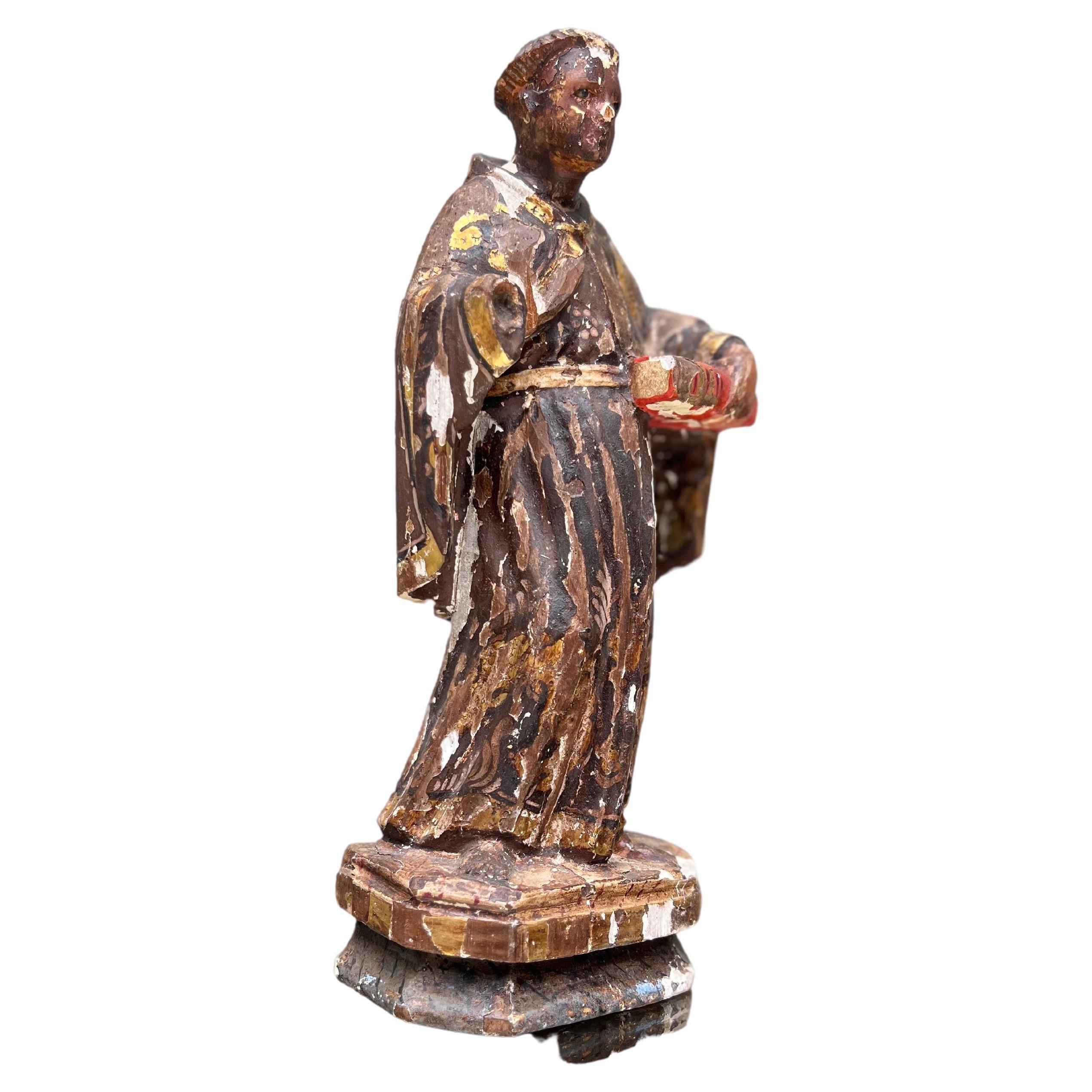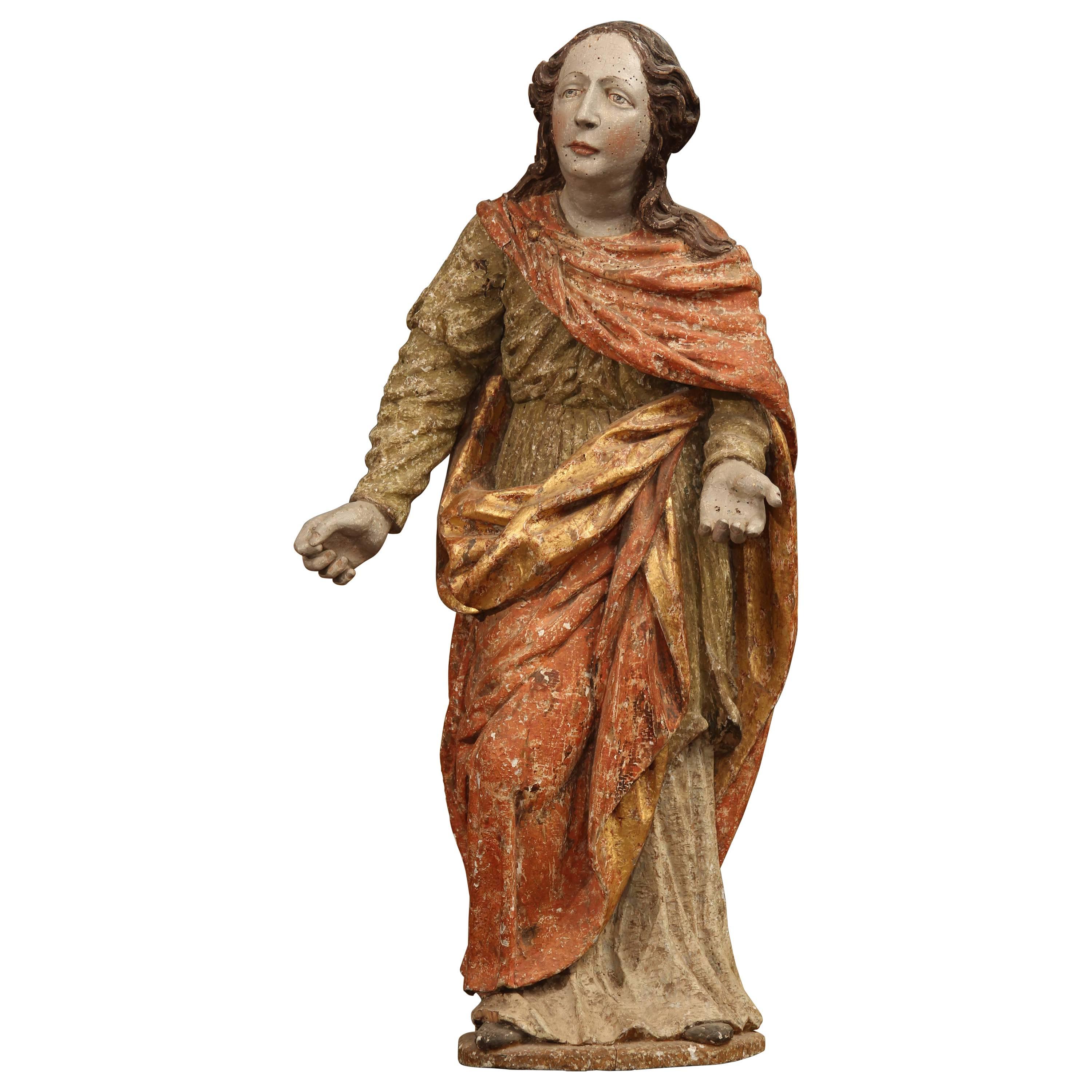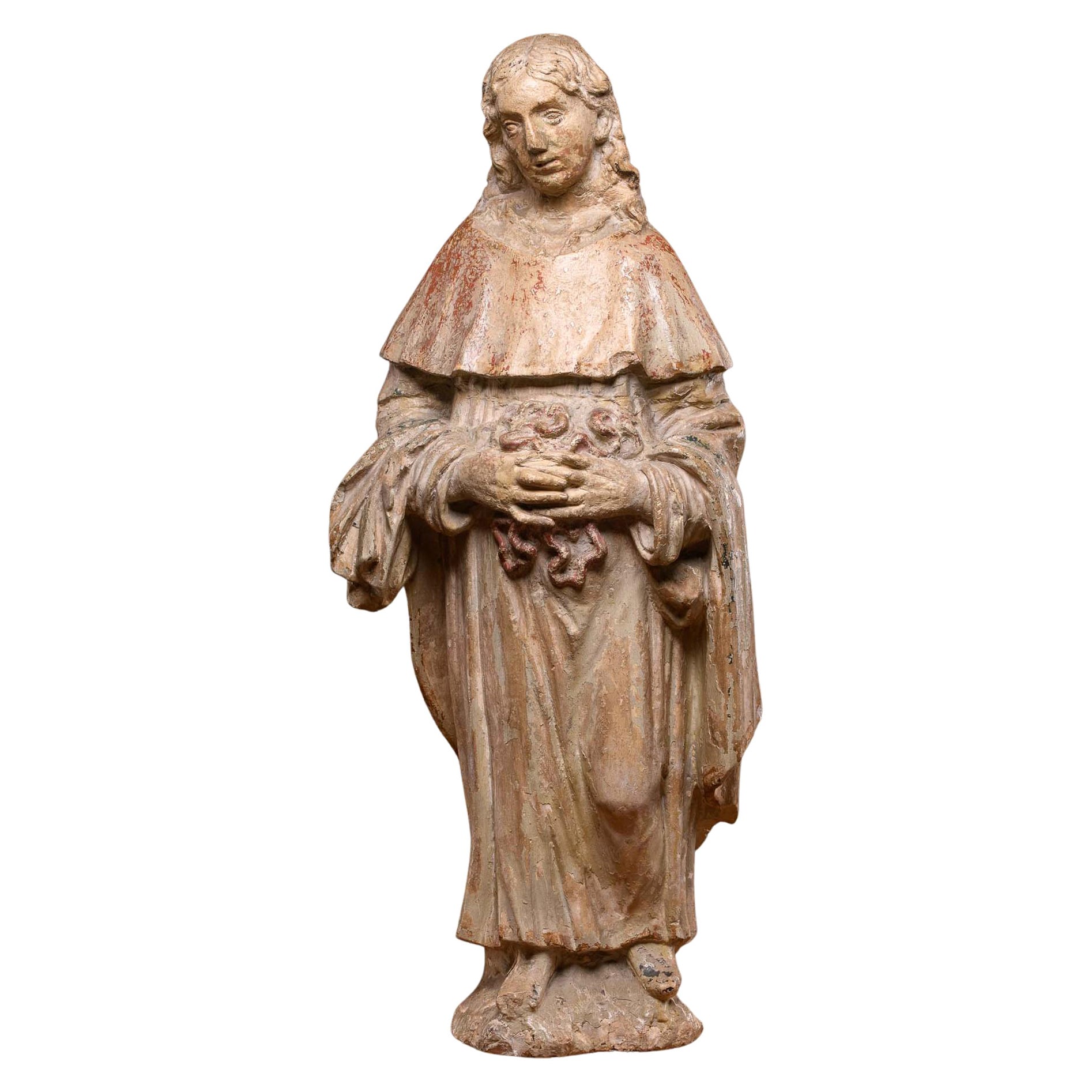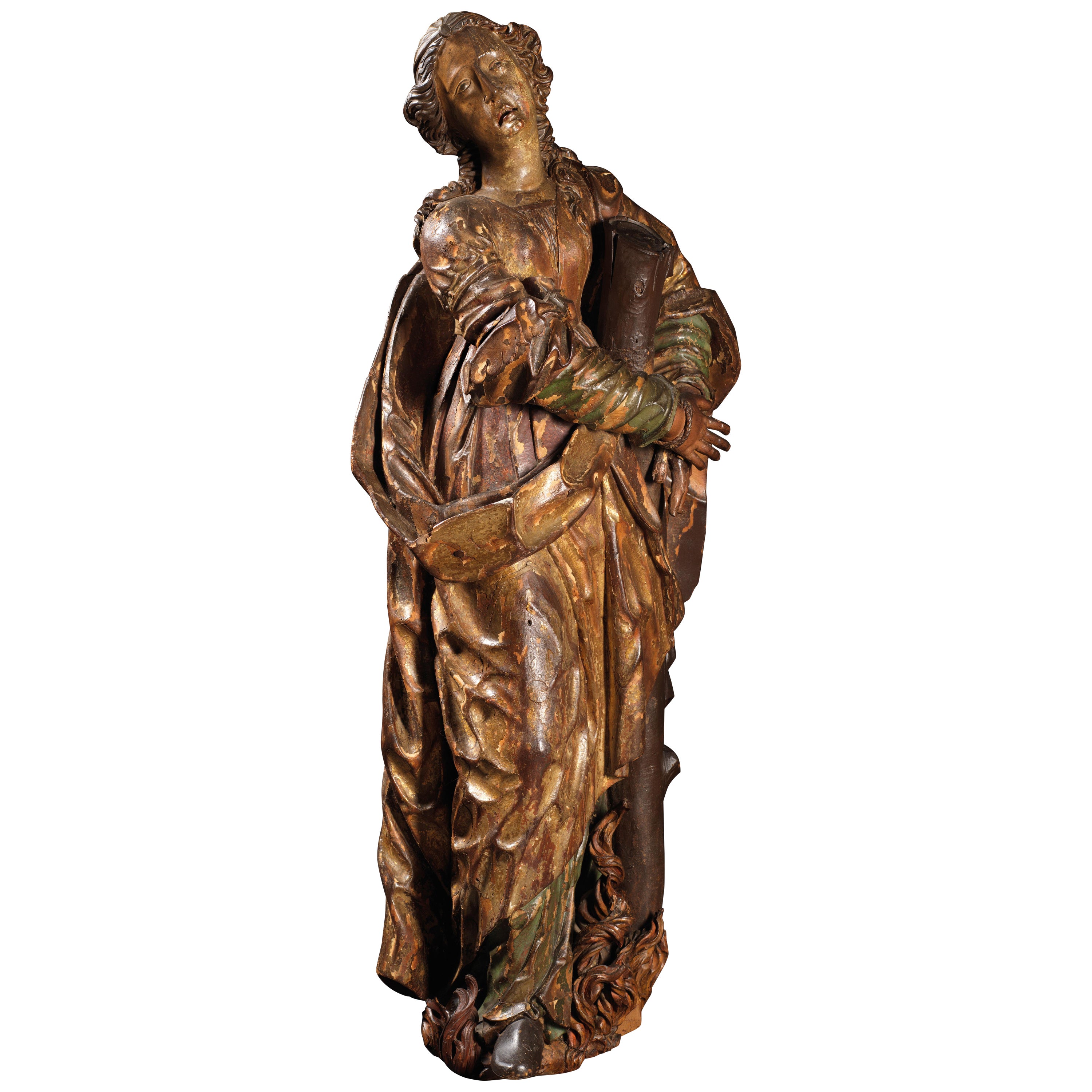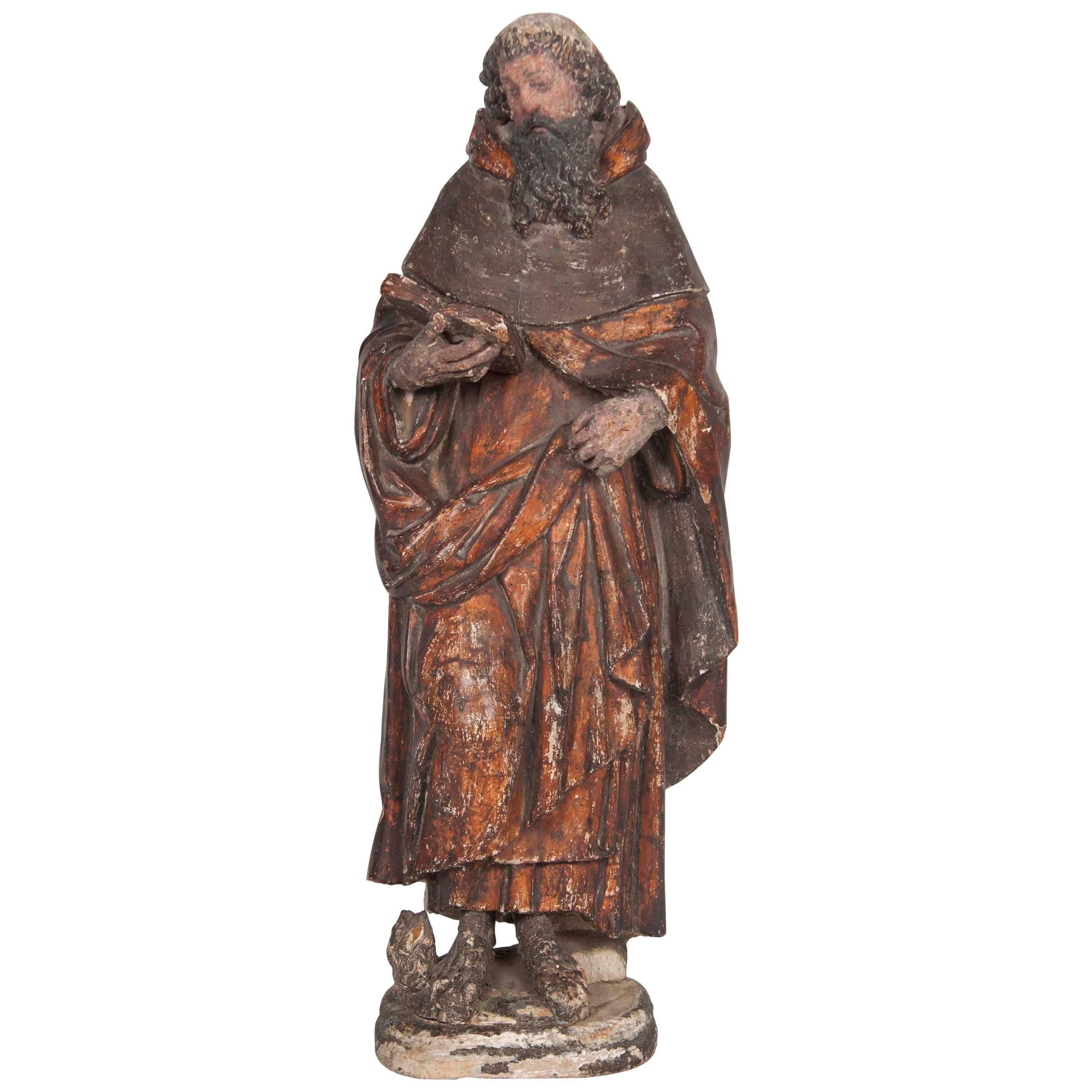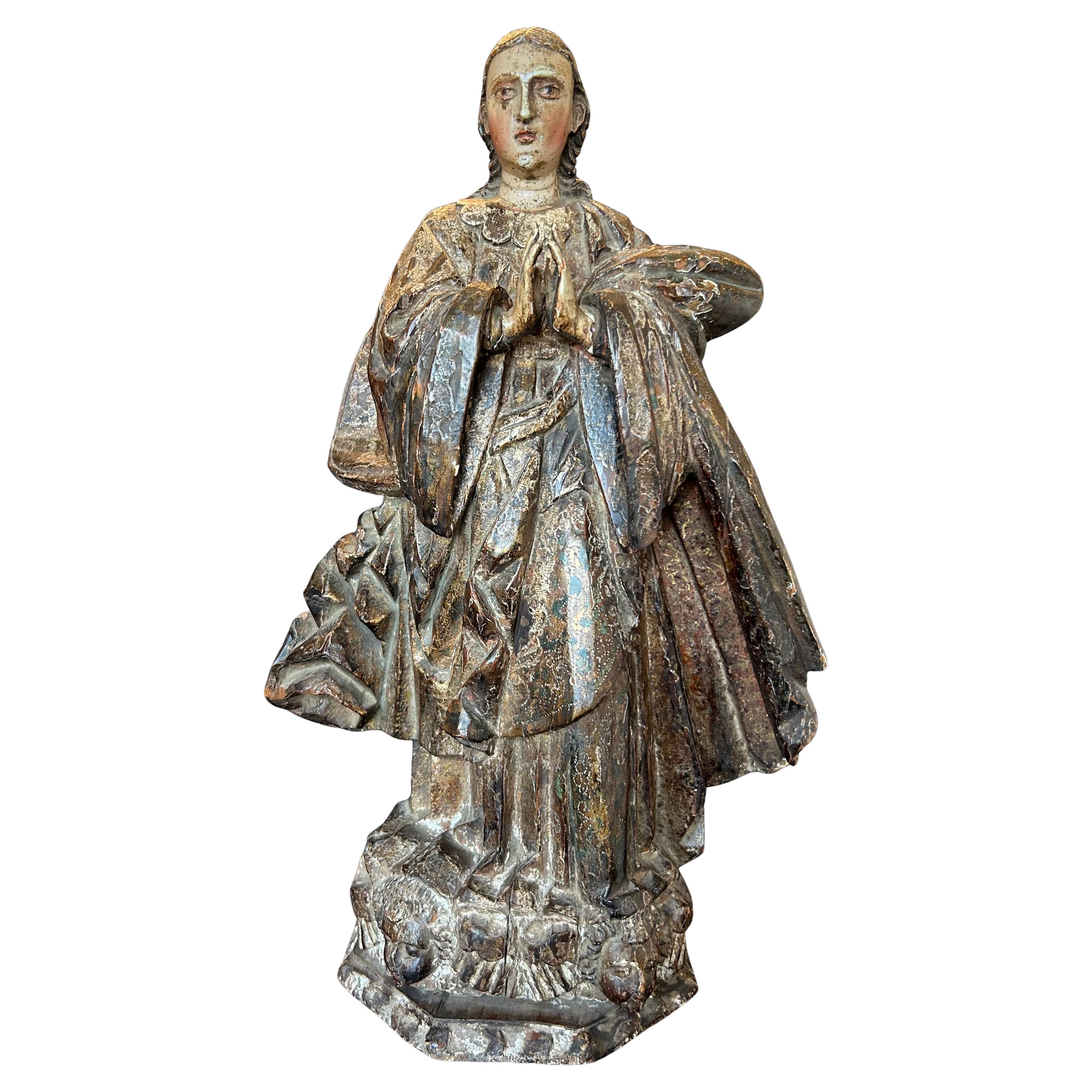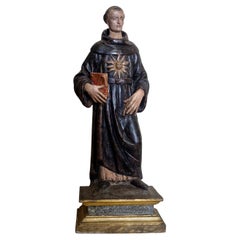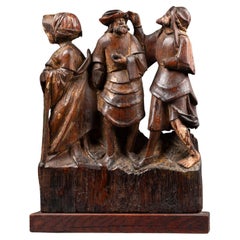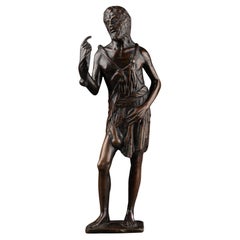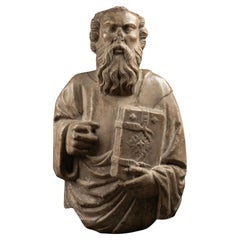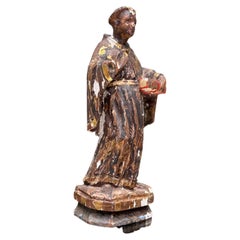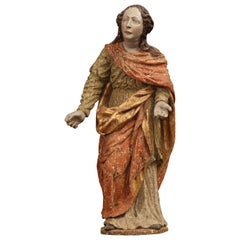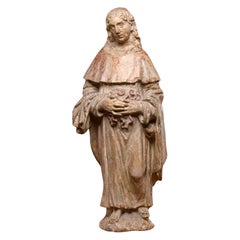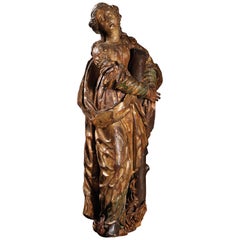Items Similar to Followers of Jean de la Huerta, Jean de Blany ? - Saint Jerome
Want more images or videos?
Request additional images or videos from the seller
1 of 6
Followers of Jean de la Huerta, Jean de Blany ? - Saint Jerome
$65,954.84
£49,063.74
€55,000
CA$90,314.73
A$100,417.70
CHF 52,432.58
MX$1,222,327.86
NOK 669,016.88
SEK 626,836.85
DKK 418,684.62
Shipping
Retrieving quote...The 1stDibs Promise:
Authenticity Guarantee,
Money-Back Guarantee,
24-Hour Cancellation
About the Item
Followers of Jean de la Huerta, Jean de Blany ?
Saint Jerome
Limestone
Burgundy, second half of the15th century
60,5 cm
ALR Ref : S00248050
This exquisite sculpture of Saint Jerome, carved from soft, nearly white limestone typical of eastern France, exemplifies the exceptional craftsmanship of 15th-century Burgundian art. The figure of Saint Jerome, a key figure in Christian history renowned for translating the Bible into Latin, is depicted wearing a cardinal’s hat and holding the Vulgate Bible. A lion at his side symbolizes the legendary tale of Jerome taming a wild beast by removing a thorn from its paw. The sculpture’s serene and spiritual quality is captured through the figure’s small yet square face, with delicate features such as stretched eyes and a thin, composed mouth.
Firmly rooted in the illustrious Burgundian sculptural tradition, this work reflects the enduring influence of the renowned Spanish sculptor Jean de la Huerta (1413–1462), who worked for Duke Philip the Good of Burgundy. De la Huerta, along with other prominent artists in Dijon, played a key role in shaping the artistic identity of the region.
This sculpture of Saint Jerome showcases the key features of this distinguished tradition, with a particular emphasis on realism and meticulous attention to details in drapery. The intricate rendering of Saint Jerome’s mantle and hat, along with the thick folds of the drapery gently pooling at his feet, highlight the Burgundian mastery of lifelike representation, particularly in the depiction of clothing. Notably, three inverted V-shaped pleats at the front of the garment reflect the Flemish and Germanic influences present in Jean de la Huerta’s later works, such as the Saint Denis in Moutiers-Saint-Jean Church.
The figure’s pronounced, angular facial structure—with its broad face, square jaw, and pronounced cheekbones—aligns with the stylistic conventions of the period. These features are particularly reminiscent of works by Jean de la Huerta, such as the Saint Bishop in the Musée Rolin in Autun (inv. no. ML.1305).
The low forehead, accentuated by the wide brim of the hat, along with the large, flattened cheeks and small mouth forming a circumflex shape, adds further character to the piece. The crescent-shaped eyes, framed by prominent eyelids and well-defined eyebrows, enhance the expressive quality of the sculpture.
These distinctive features are reminiscent of other notable Burgundian works, such as Richard de Plaine’s praying figure from the Jacobins Chapel in Poligny and the Saint Jean from the Calvary in the Saint-Anatoile Church in Salins, attributed to Jean de Blany. A follower of Jean de la Huerta, Blany upheld his master’s stylistic tradition, evident in the depiction of the characteristic angular faces, with introspective expressions and delicate, serene features, as seen in this sculpture.
Despite its modest size, this Saint Jerome exudes a monumental presence. Its connection to the artistic milieu of the Burgundian ducal court suggests that it was likely commissioned by a high-ranking political or ecclesiastical figure, further underscoring its significance within the cultural and historical context of the time.
Bibliography:
Baudoin, Jacques. Les Grands Imagiers d'Occident. Nonette: Éd. Créer, 1983. 264 p. Partie V, pp. 172–181.
Baudoin, Jacques. La Sculpture Flamboyante en Bourgogne - Franche-Comté. Nonette: Éd. Créer, 1996.
Boccador, J. Statuaire Médiévale en France de 1400 à 1530. Zoug, vol. I, 1974.
Camp, Pierre. "Les Imageurs Bourguignons de la Fin du Moyen Âge." Cahiers du Vieux-Dijon, nos. 17-18, 1990, pp. 118-141.
Chabeuf, Henri. "Jean de la Huerta, Antoine Le Moiturier et le Tombeau de Jean sans Peur." Mémoires de l'Académie des Sciences, Arts et Belles-Lettres de Dijon, 1890-1891, 4e série, vol. II, 1891, pp. 137-271. Read online.
Jugie, S. The Mourners: Tomb Sculptures from the Court of Burgundy. Yale University Press, 2010. Especially pp. 76-79, 86, 92, 98-99.
Quarré, Pierre, ed. Jean de la Huerta et la Sculpture Bourguignonne au Milieu du XVe Siècle. [Exhibition at the Musée des Beaux-Arts de Dijon], Palais des Ducs de Bourgogne, Dijon, 1972.
Quarré, P. La Sculpture en Bourgogne à la Fin du Moyen Âge. Fribourg, 1978.
La Sculpture Bourguignonne en Auxois et en Autunois à la Fin du XVe Siècle. Musée de Dijon, Palais des Ducs de Bourgogne, 1974
- Dimensions:Height: 23.82 in (60.5 cm)Width: 8.27 in (21 cm)Depth: 6.7 in (17 cm)
- Style:Renaissance (Of the Period)
- Materials and Techniques:
- Place of Origin:
- Period:
- Date of Manufacture:15th century
- Condition:Repaired: the lion and the hat of saint Jerome have been slightly restored. Wear consistent with age and use.
- Seller Location:Bruxelles, BE
- Reference Number:1stDibs: LU6666243890842
About the Seller
5.0
Vetted Professional Seller
Every seller passes strict standards for authenticity and reliability
1stDibs seller since 2022
15 sales on 1stDibs
Typical response time: 4 hours
- ShippingRetrieving quote...Shipping from: Bruxelles, Belgium
- Return Policy
Authenticity Guarantee
In the unlikely event there’s an issue with an item’s authenticity, contact us within 1 year for a full refund. DetailsMoney-Back Guarantee
If your item is not as described, is damaged in transit, or does not arrive, contact us within 7 days for a full refund. Details24-Hour Cancellation
You have a 24-hour grace period in which to reconsider your purchase, with no questions asked.Vetted Professional Sellers
Our world-class sellers must adhere to strict standards for service and quality, maintaining the integrity of our listings.Price-Match Guarantee
If you find that a seller listed the same item for a lower price elsewhere, we’ll match it.Trusted Global Delivery
Our best-in-class carrier network provides specialized shipping options worldwide, including custom delivery.More From This Seller
View AllAgnolo di Polo Firenze 1470 - Arezzo 1528' - Saint Nicholas of Tolentino
Located in Bruxelles, BE
Agnolo di Polo (Firenze 1470 - Arezzo 1528)
Saint Nicholas of Tolentino
Around 1510-1520
Painted and gilded terracotta
55.5 x 24 x 16.5 cm
San Nicholas de Tolentino is represe...
Category
Antique 16th Century Italian Renaissance Figurative Sculptures
Materials
Terracotta
$15,349 Sale Price
20% Off
Group of Altarpiece - Antwerpen, 16th century
Located in Bruxelles, BE
Group of altarpiece representing the life of a Saint, Saint Renualde?
Engraved by the sign of Antwerp hand on the hat of the central character
Carved oak, traces of polychromy
Fir...
Category
Antique 16th Century Belgian Renaissance Figurative Sculptures
Materials
Oak
$15,349 Sale Price
20% Off
Saint John the Baptist
- After a model by Bertoldo di Giovanni
Located in Bruxelles, BE
Saint John the Baptist
Bronze
After a model by Bertoldo di Giovanni (ca. 1440–1491)
Northern Italy, 18th century
27,5 x 8 x 5 cm
This finely cast and patinated bronze statuette ...
Category
Antique Late 18th Century Italian Renaissance Figurative Sculptures
Materials
Bronze
Circle of Pierpaolo and Jacobello Dalle Masegne (Venice, late 14th century)
Located in Bruxelles, BE
Circle of Pierpaolo and Jacobello Dalle Masegne (Venice, late 14th century)
San Bartolomeo
high relief 'en applique'
white marble
52 x 30 x 14 cm
Provenance :
Collection South of...
Category
Antique 15th Century and Earlier Italian Gothic Figurative Sculptures
Materials
Marble
Statuette of the Virgin, South German circa 1600
Located in Bruxelles, BE
Statuette of the Virgin
South-German, circa 1600
sculpted wood
circa 1600
(right arm restored)
52 cm
Category
Antique 17th Century German Renaissance Religious Items
Materials
Wood
Christ - Umbria, second half of the 15th century
Located in Bruxelles, BE
Christ
Umbria, Orvieto?
Second half of the 15th century
77 x 16.5 cm
Category
Antique 15th Century and Earlier Italian Renaissance Figurative Sculptures
Materials
Walnut
You May Also Like
Antica scultura lignea Raffigurazione di Santo
Located in Milano, MI
Antica scultura lignea Raffigurazione di Santo
Descrizione
Antica scultura policroma lignea
Presenta mancanze date dal tempo
1800
Produzione: Ita...
Category
Antique Mid-19th Century Italian Figurative Sculptures
Materials
Wood
18th Century Italian Saint
Located in Seattle, WA
Beautifully carved wood saint , late 18th century , Italy.
Category
Antique 18th Century Figurative Sculptures
17th C Stone statue of Saint Erasmus or Saint Elmo
Located in Leuven , BE
Saint Erasmus or Saint Elmo (Antioch, ca. 240 – Formia, 303) was an Italian bishop and patron saint of the sailors. His attribute was the capstan, a winch on which the anchor chains were rolled up. He died as a martyr for his faith, and his bones were transferred to Gaeta in the 9th century, where they are kept in the cathedral to this day. The electric phenomenon of Saint Elmus fire is named after Saint Erasmus and the 16th C humanist Desiderius Erasmus. Little is known with certainty about Saint Erasmus' life. However, many legends may have been passed on orally until the - no older writings are known with certainty. His birthplace was in present-day Syria. However, the persecution of Christians under Emperor Diocletian forced him to flee to Mount Lebanon...
Category
Antique 17th Century Belgian Figurative Sculptures
Materials
Stone
Saint Afre of Augsburg
Located in Saint-Ouen, FR
SAINT AFRE OF AUGSBURG
ORIGIN : SOUTHERN GERMANY
PERIOD : 16th CENTURY
Height : 119 cm
Width : 50 cm
Depth : 28 cm
Limewood
Good state of conservation
Patron Saint of the city and the diocese of Augsburg, the oldest traces of her worship date back to the 6th century.
There are several versions of his legend. She is sometimes identified as the daughter of a king of Cyprus whose violent and unexpected death forced her and her mother, Hilaria, to flee. They went to Augsburg via Rome. Others see her origins in Africa instead, her name meaning African in Latin.
Settled in Augsburg, they became the owners of a notorious inn where they traded in their charms.
Bishop Narcissus of Girona, accompanied by his deacon Felix, found refuge there one day, fleeing the persecution of Emperor Diocletian. As the two men prayed devoutly, Afre was touched by grace and asked to be baptized. She then left her old life and embraced the Christian faith.
When the Roman authorities learned of his new vocation, they exhorted her to worship the old gods and to deny the Christian faith. She refused to renounce her faith and was sentenced to be burned alive. Her sentence was applied immediately and she suffered her mart...
Category
Antique 16th Century Figurative Sculptures
Materials
Wood
$23,983
16th Century Italian Renaissance Carving of a Male Saint
Located in Stamford, CT
16th century Italian carved and polychromed figure of a male saint or prophet with a wonderful presence. Shown holding an open book in his right hand with flames at his feet, mid-16t...
Category
Antique 16th Century Italian Renaissance Religious Items
Materials
Wood
18th Century French Polychrome Painted Saint
Located in Toronto, CA
A stunning polychrome figure of a Saint from the late 18th century or early 19th century, from France. This is one of the most beautifully carved Saints we have ever featured, with t...
Category
Antique Early 19th Century French Baroque Figurative Sculptures
Materials
Wood
More Ways To Browse
15th Century Spanish
Praying Hands
Spanish Furniture 15th Century
1983 Clothing
Antique Camp Furniture
Antique French Bible
Les Pierre Antiques
Salins France
Carved Bishop
Limestone Saints
Spanish Mantle
P J Antoine
Ecclesiastical Antiques
Christian Duc
Pierre De Bourgogne
Cast Iron Fox
Chinese Rose Quartz
Clesinger Bronze
